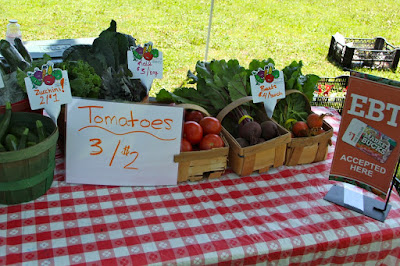As an antidote to the abysmal weather, we made some limited progress this morning in our continuing search of the meaning of "local." That helps account for the out of season picture of a local farmers market.
 |
| how far did the vegetables travel? how about the customers?
Photo by J. Harrington
|
Wikipedia's entry for Local food (an article with multiple issues) clearly and unequivocally states:
"No single definition of "local" or "local food systems" exists....Among the more widely circulated and popular defining parameters is the concept of food miles, which has been suggested for policy recommendations."[7]The Food, Conservation, and Energy Act of 2008 includes a definition, with "locally" and "regionally" grouped together and defined as:
‘‘(I) the locality or region in which the final product is marketed, so that the total distance that the product is transported is less than 400 miles from the origin of the product; or‘‘(II) the State in which the product is produced.— H. R. 2419
"The concept of "local" is also seen in terms of ecology, where food production is considered from the perspective of a basic ecological unit defined by its climate, soil, watershed, speciesand local agrisystems, a unit also called an ecoregionor a food shed. Similar to watersheds, food sheds follow the process of where food comes from and where it ends up.[8]
We find that 400 miles seems excessive when compared with some of Christopher Alexander's concepts in A Pattern Language:
The region is made up of a hierarchy of social and political groups from the smallest and most local groups-- families, neighborhoods and work groups -- to the largest groups -- city councils, regional assemblies.The Lexicon of Sustainability provides interesting insights into the meaning of "local."
Local The principle that a given entity belongs or relates to a particular area.The USDA also uses distances to help define food deserts, with different scales depending on whether the travel mode is walking (1 mile max.) or driving (20 miles max.).
- Jessica Prentice
Local Food that was produced and distributed in one’s community.
Local Local brings you back into a relationship with the source of your food, with the land, the animals, the plants, the farmers, and with each other.
– Douglas Gayeton, LOCAL: The New Face of Food and Farming in America
Local food system
A regional food system is one that supports long-term connections between farmers and consumers while meeting the economic, social, health and environmental needs of communities in a region. A food system includes everything associated with growing, processing, storing, distributing, transporting and selling food. A food system is local when it allows food producers and their customers to interact face-to-face; regional systems serve larger geographical areas, often within a state or metro area.
– Leopold Center for Sustainable Agriculture
Demand triggers Inspiration. Capability increases Capacity. Profit encourages Expansion. Then the cycle repeats. This is how local food systems are built.
– Douglas Gayeton, LOCAL: The New Face of Food and Farming in America
Local foodshed
A geographic area where food is grown and consumed; it also accounts for population density, land quality, and available distribution routes.
- John Lagier
Locavore
“Locus” (latin root for “local”) + “vorare” (latin root for “to devour”) = locavore
- Jessica Prentice
We didn't expect this quest to be easy, but neither did we think it would be quite this complex. Then, again, the International Space Station is only about half of 400 miles above the earth, and that's certainly not considered local, is it?
Locals
By James Lasdun
They peopled landscapes casually like trees,being there richly, never having gone there,and whether clanning in cities or village-thin standswere reticent as trees with those not born there,and their fate, like trees, was seldom in their hands.Others to them were always one of twoevils: the colonist or refugee.They stared back, half disdaining us, half fearing;inferring from our looks their destinyas preservation or as clearing.I envied them. To be local was to knowwhich team to support: the local team;where to drop in for a pint with mates: the local;best of all to feel by birthright welcomeanywhere; be everywhere a local...Bedouin-Brython-Algonquins; always therebefore you; the original prior claimthat made your being anywhere intrusive.There, doubtless, in Eden before Adamwiped them out and settled in with Eve.Whether at home or away, whether kidsplaying or saying what they wanted,or adults chatting, waiting for a bus,or, in their well-tended graves, the contented dead,there were always locals, and they were never us.
********************************************
Thanks for visiting. Come again when you can.
Please be kind to each other while you can.
No comments:
Post a Comment